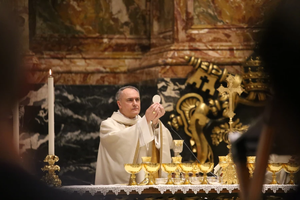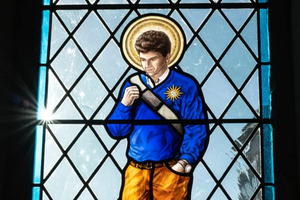Love, Not Genius, Will Save Your Fallen-Away Loved Ones
COMMENTARY: Take a lesson from St. Augustine and St. Monica: Prayer is the single most effective answer to this problem, as it is to all problems.

There is a problem with geniuses.
The problem is that most people aren’t geniuses. So, when we do discover a genius every so often, we have to do our best with our ordinary minds to understand the insights of a brilliant mind. Such is the case with the genius of St. Augustine.
Augustine was not only a prolific writer, writing more than almost anyone will read in a lifetime, but his work has a tremendous depth. His training in rhetoric gave him an uncanny ability to convey profound truths in a distinctly winsome way. But then there are times when his genius seems to get in the way.
For instance, perhaps his most famous work, Confessions, is widely quoted and appreciated for both the style with which the story is told and the depth of psychological insight that remains relevant even 1,600 years later. However, there are several occasions where Augustine shares a story that has been widely appreciated for its sentimental value, but overlooked for its theological significance.
One of these instances involves an exchange between his mother, St. Monica, and her priest regarding the state of Augustine’s soul. At this point, Augustine is being led astray by a popular heretical group of his day, the Manichaeans. The scene depicts a desperate Monica, who had been tirelessly praying for her son’s return to the faith, pleading with the priest to talk to her son. Despite his denying her request, he assures her that “it is impossible that the son of these tears should perish.”
What’s more, Augustine shares that his mother would often recount this story to him and that “she had accepted this answer as if it had sounded from heaven.” While someone unfamiliar with the rest of the work can recognize the emotional power of this scene, one more familiar with the work recognizes that Augustine is trying to communicate something very significant about the nature and efficacy of prayer.
Augustine was carried away by many temptations in his early years, not just Manichaeism, including his well-known participation in hedonism. Another vice he wrestles with in his story is the theater, and his reflections on this struggle provide wonderful insight into the exchange just described.
Augustine found that those who went to the theater were actually seeking feelings of pity. He observes that they would be disappointed if they left the show without a sufficient cry. He finds this to be fundamentally disordered.
For Augustine, pity, like all of the passions, is good when it’s directed by love toward its proper end. Pity is a passion that Augustine believes should inspire one to act on behalf of the one who is being pitied. Therefore, the theater represented a strange place for Augustine — a place of all pity and no action.
Whether one agrees with Augustine’s reflections on the theater does not matter here. What is particularly interesting is how Monica demonstrates a properly ordered response to pity.
But, if Monica had a properly ordered response to pity, this means that she must have been led to some action to remedy the object of her pity. She feels for the suffering of Augustine before he even recognizes it as suffering, but what does she do about it? What is her action?
She prays. Constantly. Augustine is trying to very subtly show us that prayer is not a passive or secondary way in which we come to the aid of others, but an active and primary way to assist. The things Monica does that we conventionally think of as actions — such as convincing a priest to talk to him or trying to dissuade him from going to Rome — are all pathetically unsuccessful. But it is her prayers that influence the trajectory of Augustine’s life. And as he tells his story, he is always sure to demonstrate how closely his providential path is aligned with his mother’s persistent prayers.
While the stories of these two great saints have always captured the imagination of believers, it is of particular importance today. A cross that many mothers carry is the dismay over their adult children who have lost their faith. The lives of Sts. Monica and Augustine provide us not only with hope and a road map for how one ought to respond to such a crisis, but insight into understanding the crisis itself better.
The first lesson is that prayer is the single most effective answer to this problem, as it is to all problems. Those who are saddened by their adult children falling away from the faith should first feel affirmed that this is an objectively upsetting thing, but also encouraged to bring this sorrow to the Lord. He can’t wipe our tears if we don’t cry to him.
Second, we should recognize that the promise given to Monica is that it was impossible that her son should perish — but not impossible that he should suffer. Our Lord answers all prayers, but those answers are not always immediately perceptible to us. Augustine is writing his stories many years later and sees the fruit of his mother’s prayers, but that does not mean that she could perceive any of this in the moment. As the philosopher Søren Kierkegaard said, “Life can only be understood backward, but must be lived forward.”
It is indeed a tragedy that there is so much genius in Augustine that we will never be able to understand everything he has to teach. But there is one particular lesson that sticks out here. When one of the greatest geniuses who ever lived applied his mind to all there is to be pondered, one of the greatest mysteries he found was that the faith of ordinary people like his mother was far more powerful than his mind. And he realized this not by theological reflection, but through his mother’s profound devotion and witness to the faith.
St. Monica, patron of mothers facing family difficulties, pray for us!
















